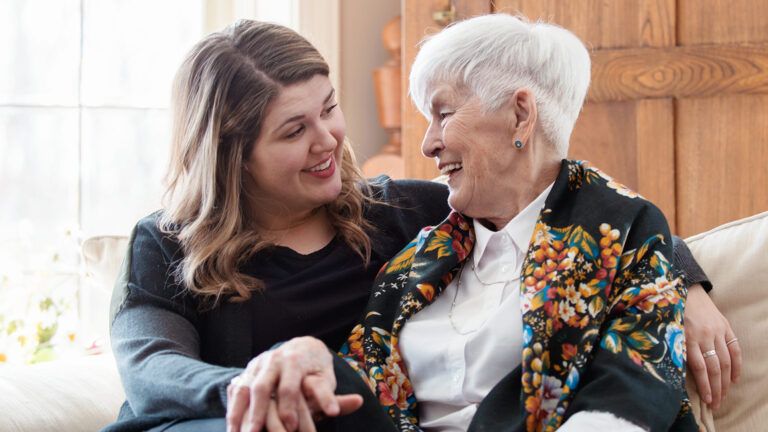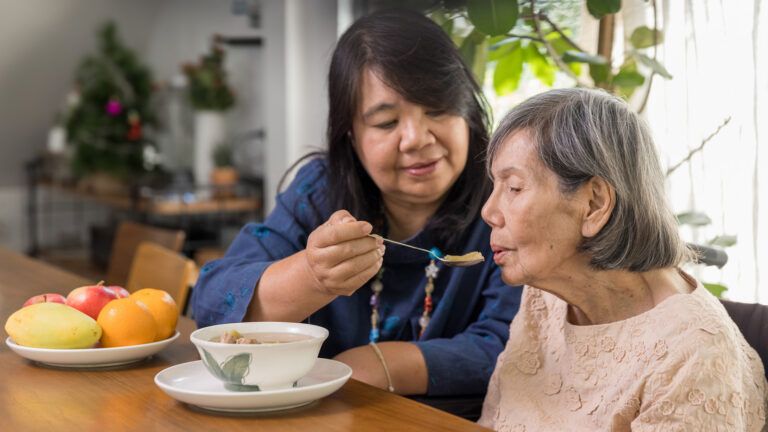Julie Hayes is the Editorial Assistant at Benjamin Rose Institute on Aging
Caregiving for your loved one involves a host of challenges, not least of which is the shift that occurs in the relationship dynamic between the two of you. This is a factor whether you are caring for a spouse, offspring, brother or sister or a friend. On the upside, the caregiving experience can strengthen and deepen your bond. On the opposite side of the spectrum, the responsibilities of caregiving can strain even the closest relationship. There are things you can do as a caregiver, however, to keep stress at bay and avoid potential pitfalls, in order to improve your overall wellness and that of your loved one.
If relationship strain caused by caregiving has become an issue for you and your loved one, it is crucial to find ways to rekindle and maintain the good aspects of the emotional bond you had to begin with, and even to build upon them. Studies show that the quality of your relationship with the loved one you care for is one of the most important variables in the degree of the negative effects of burden you may experience as a caregiver, such as depression, poor physical health and high mental strain. A close relationship can also improve your loved one’s satisfaction with the care they receive, as well as their physical and mental wellness (Jeanne R. Snyder PhD (2000) Impact of Caregiver-Receiver Relationship Quality on Burden and Satisfaction, Journal of Women & Aging, 12:1-2, 147-167).
Below are some ways to help you both avoid and repair relationship strain that has been brought on by the stresses of caregiving:
- Allow yourself respite time for a better perspective
When you don’t take breaks from caregiving, you can quickly become tired, overburdened and unhappy, and these turbulent emotions can spill over onto your loved one. Giving yourself some respite can go a long way to reduce your feelings of burnout, exhaustion and isolation, and give you the opportunity to gather your thoughts and emotions. Find workable times you can set aside for relaxing activities or hobbies, or take time to rest. You can ask someone else in the family or a friend to step in to briefly take over your responsibilities while you take a break. You can also find programs and services that support caregiver respite by using the U.S. Administration on Aging’s Eldercare Locator.
- Be more sensitive when communicating
Proper communication is key to heading off and resolving relationship strain. Keep the following tips in mind:
- Be patient. Don’t interrupt when your loved is phrasing thoughts. Wait to respond until he or she is finished speaking
- Try not to raise your voice or speak in an angry tone.
- Use tact when bringing up difficult topics, but do not avoid them altogether as this may lead to stress in the future.
- Save conversations that can wait until the person is feeling well rather than tired, upset or stressed out.
- Use a close friend or relative as a sounding board instead of unloading your negative emotions on your loved one. If you think you need additional help, consider scheduling an appointment with a counselor, or enrolling in a program such as BRI Care Consultation™ to help you manage your loved one’s care.
- Take your loved one’s preferences into account
Your loved one may not agree with many of your caregiving choices, which may result in distress or frustration. Make an effort whenever you can to consider the person’s preferences and respect what he or she values most. Ask yourself, “What matters most to my loved one?” Whether it’s independence, safety, participation in especially meaningful activities, not being a burden or having a say in who helps with certain tasks, be sure to reflect these values in the care you provide. (Orsulic-Jeras, S., Whitlatch, C. J., Szabo, S. M., Shelton, E. G., & Johnson, J. (2016). The SHARE program for dementia: Implementation of an early-stage dyadic care-planning intervention. Dementia. Advance online publication. doi: 1471301216673455).
- Separate the disease from the person
Keep in mind that people who have dementia or another chronic health condition that may lead to challenging behaviors are being affected by something outside of their control. It is understandable to be angry at the disease, but taking it out on your loved one may only upset and confuse him or her. It is also important to recognize that difficult behavior is often a form of communication, and listening and trying to determine what someone needs may solve the concern faster than getting frustrated or upset (Katherine S. Judge, Sarah J. Yarry, Wendy J. Looman, David M. Bass; Improved Strain and Psychosocial Outcomes for Caregivers of Individuals with Dementia: Findings from Project ANSWERS, The Gerontologist, Volume 53, Issue 2, 1 April 2013, Pages 280–292).
- Accept help
If you are still struggling to maintain a positive relationship with your loved one, do not be afraid to seek outside help. Many caregiver support groups offer a safe environment in which to discuss your concerns and frustrations with peers who may be undergoing similar challenges. Caregiver coaching programs, such as Benjamin Rose Institute on Aging’s BRI Care Consultation™, can also assist you in finding solutions to your concerns, and access community resources that can provide additional support.






